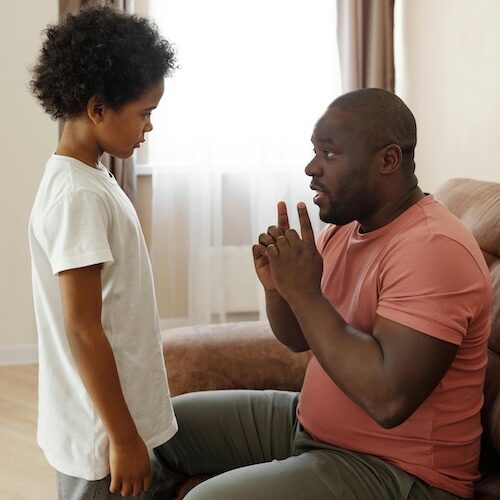Many parents find themselves nervous or unsure when it comes to talking with their children about sex, pornography, and staying safe online. And that nervousness is understandable. This is especially the case when we may still struggle with shame or guilt in these areas ourselves.
Nonetheless, these topics can feel uncomfortable, awkward, or even distasteful. Yet avoiding them leaves children to navigate a world of confusing messages all alone. But honest, open conversations give kids the tools to make healthy decisions, understand their feelings, and ask questions without shame.
Realize though that the goal when talking to your kids about these matters is not to lecture or control them, but to create a safe space where curiosity is welcomed and support is always available. Here are eight key principles for fostering honest conversations with your children when talking about tough topics like sex, porn, and the online world.
- Do not hedge or avoid difficult topics
It is very important to use clear, accurate language when talking about sex and pornography. Avoiding difficult terms or glossing over topics can make children feel that these subjects are shameful or dangerous. This means using the words penis or vagina instead of “cute” made-up words like pee-pee, etc.
Recognize that while this may feel uncomfortable, using the proper words shows respect for their curiosity and teaches them that sex and digital risks are normal topics to discuss. Hedging, giving vague answers, or using creative terms to avoid discussing body parts communicates shame and can create confusion or lead kids to rely on peers or the internet for information.
- Offer real answers, even when questions are awkward
Children often ask questions that may surprise or unsettle you. I’ve experienced this myself many times. Consequently, it is tempting to deflect or joke when fielding these awkward inquiries, but honest answers build trust.
You do not need to give more detail than is age-appropriate, but you should respond directly to the question. For example, if your child asks about pornography, you might explain what it is and why it can be harmful without shaming them. This way, by offering honest answers, you show that you value their curiosity and communicate that no question is too embarrassing to ask.
- Acknowledge that curiosity is normal
Curiosity about sex and digital content is natural. Your child needs to know it is better to ask questions than to make assumptions based on incomplete information. Encourage your child to come to you with ANY question and make it clear that they are always safe to ask, no matter what. You might say, “It is okay to wonder about these things, and you can always ask me.” This reassurance fosters trust and encourages ongoing dialogue.
- Discuss both the positive and negative sides of things
Listen, it is important to be honest about both the appeal and the potential harms of something like pornography or premarital sex. These things may feel good and can be very tempting, especially when your child is stressed, emotional, or seeking connection and approval. At the same time, these behaviors can and will affect their understanding of relationships, intimacy, and self-esteem.
Therefore, explaining both sides helps your child make informed choices. If you only acknowledge the problems without recognizing the lure, you come across as inauthentic and therefore not trustworthy. It’s important to be a straight shooter about these Pandora’s box–type issues so your warnings and advice maintain a high degree of credibility.
- Support autonomy while offering guidance
Your child must understand that they have the power to make their own choices. Of course, that level of autonomy will vary based on age and maturity. But ultimately, you cannot make decisions for them. You can only guide and support so the best decisions are hopefully made when the time comes.
You can communicate this clearly by saying, “You have the ability to make your own choices, and I am here to help you think through them. I will support you, even when you make mistakes.” This approach teaches responsibility and critical thinking and shows that making a wrong choice is part of learning.
- Normalize differences from peers
The truth is that living a healthy sexual life may seem foreign to most of your child’s friends. Kids may feel pressure to conform to what they see online or hear from peers. But honest conversations help normalize their feelings and give them the tools to make choices that align with their values, rather than simply following the crowd. As a parent, you can emphasize that it is okay to live differently and that healthy choices may not always match what their friends are doing.
- Include digital safety as part of honesty
Being honest about digital risks is essential. Your child needs to understand issues like pornography, online harassment, privacy, and consent. You can explain potential dangers and provide practical strategies for staying safe, such as using passwords, setting privacy settings, or coming to you if something uncomfortable happens online.
Ultimately, honest conversations about the digital world help your child navigate it responsibly and build confidence in their decisions.
- Build ongoing trust through consistent honesty
Honesty is not a one-time conversation. It is an ongoing commitment to being available, supportive, and truthful. Regularly checking in, answering questions, and discussing real-world situations reinforces that your child can come to you safely. Over time, this consistency teaches your child to approach sexual development thoughtfully and make decisions based on information, values, and self-awareness.
Listen, this stuff isn’t fun and can be very uncomfortable. Even scary. But talking honestly with your children about sex, pornography, and digital safety better equips them to navigate complex situations responsibly. When you embrace discomfort and maintain open dialogue, you help your children grow into self-aware, resilient adults capable of making healthy choices in a challenging digital and social world.


